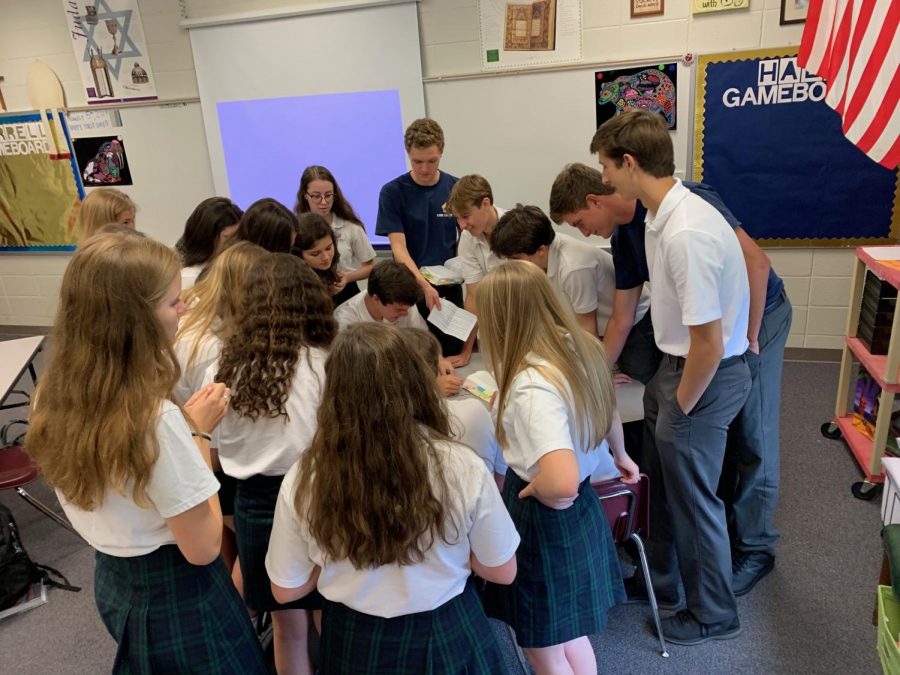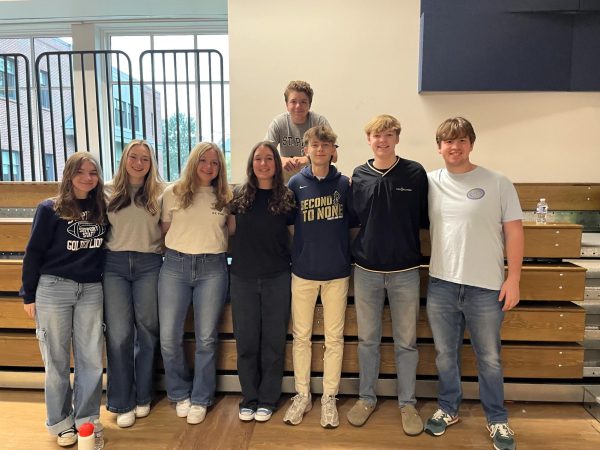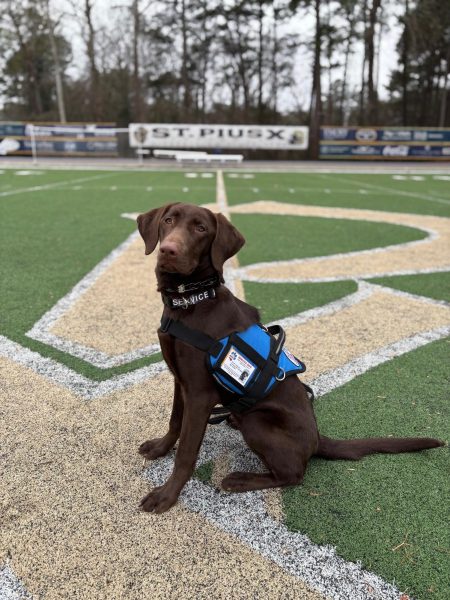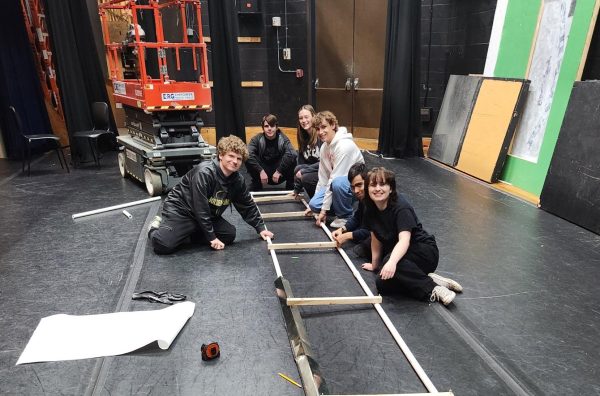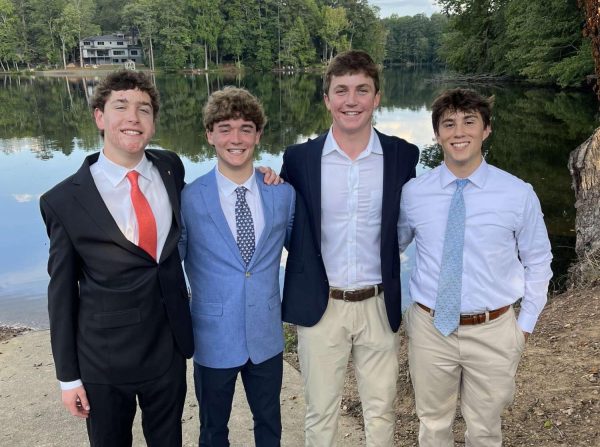Dr. Hall and Mrs. Farrell gamify junior theology course
Using a game-based learning system, the two teachers have completely modified their Catholicism and Major Faiths of the World class
One of Dr. Liberty Hall’s junior theology classes plays a competitive game to learn new material. Dr. Hall and Mrs. Lindsey Farrell have completely gamified the entire Catholicism and Major Faiths of the World course
One of the most well-known teaching duos at St. Pius X is theology teachers Dr. Liberty Hall and Mrs. Lindsey Farrell. Wherever you find one, there’s a good chance you’ll find the other.
Each has taught the junior theology course Catholicism and Major Faiths of the World for several years, but this year they teamed up to turn the entire class into a game-based learning system.
According to the Science Education Resource Center at Charleston College, game-based learning typically consists of a storyline, game pieces, rewards for teams and points for students.
“Our course is now gamified, as in the entire semester is a story arc,” Mrs. Farrell said. “They have new challenges every day and get XP [experience points]. There’s prizes and rewards, too.”
Dr. Hall explained that XP could be used to give juniors particular powers and privileges to use in class. There are also gold points which students can use on a website called Classcraft to buy items like virtual clothes and pets. Although not related to the learning material, these online prizes are fun little incentives to make the game more fun.
“It’s fun and it’s competitive; it’s like a game,” junior Maddie Cast said about Classcraft. “It’s where we take team quizzes and do team learning.”
Students earn Classcraft points by participating in activities that have to do not only with the specific subject, but also with the storyline that revolves around the semester.
To introduce the year-long story, Dr. Hall and Mrs. Farrell put a backpack at an empty desk on the first day of class. Students were told that a fictional transfer student disappeared from school and later learned that he had escaped from a cult that’s now chasing him down.
The former transfer student sends messages to the students, and their goal is to help him over the course of the semester. Both Dr. Hall and Mrs. Farrell said that they couldn’t further elaborate on the story as it would spoil it for the juniors.
Not only have daily lesson plans been turned into games, but all tests and quizzes have been gamified as well. Mrs. Farrell explained that the first part of tests comes in a packet that’s filled with puzzles. Then, the students are given a sheet with multiple choice questions that the puzzle packet will help fill out.
The next day, students will do something collaborative like writing a diary entry about the unit, with one person writing the first entry and another the next, continuing until all the students have written one.
“We’re trying to see if you can take what you’ve learned and create a narrative out of it,” Mrs. Farrell said.
Even the final exam will have a game aspect to it, although Dr. Hall and Mrs. Farrell haven’t finalized the details yet. Dr. Hall explained that it’s difficult because they usually have the students work together on tests, but the final exam proctor wouldn’t be used to that, and they don’t want to overburden them.
Mrs. Farrell has an idea to build the final like those choice-based books you probably read as a kid, where one page has a question on it and the different answers tell you to flip to different pages of the book. That way the students can feel fully immersed in the story, and their choices lead them down their own path.
Her interest in game-based learning originated from her love of escape rooms, Mrs. Farrell explained. She started to learn that she could use that passion in class when she first started including Breakout EDU games into her lesson plans.
Dr. Hall said her inspiration for incorporating games into the curriculum started as soon as she came to St. Pius X.
“When I first started teaching here I introduced games,” she explained, noting that junior year is one of the toughest in high school. “Juniors are sad,” she laughed. “They get overbooked. The last thing I want is for their religion class to add to their heavy load.”
Dr. Hall also said that she found an interest in game-based learning because it helps students retain information better. Mrs. Farrell agreed.
“We found people prepare better when they want to win,” Mrs. Farrell said. “We’ve seen that the motivation has increased” as well as “a significant improvement in grades.” For example, they said this is the first year that all students turned in their first homework assignment.
Dr. Hall and Mrs. Farrell are not alone in using games in their class. Social Studies teachers Mr. Ellis Thomas and Mrs. Rebecca Rose often use game-based learning with their students as well.
“There’s a huge gamified movement going on right now in the education world,” Mrs. Farrell said.
For instance, the National Association of Simulation and Gaming, or NASAGA, is hosting a convention in Chicago November 6-9 for teachers across the country who are using game-based learning in their classrooms.
“This is the first year Mrs. Farrell and I will go,” Dr. Hall said. “It’s a hands on opportunity to interact with other teachers doing the same thing we are.”
According to their website, NASAGA has been holding conventions since the 1970s.
Although game-based learning is becoming increasingly popular around the country, it takes a tremendous amount of work to put together. Mrs. Farrell and Dr. Hall spent most of their summers developing the new game-based course.
“Out of the eight week summer, Dr. Hall and I came in for about 5 of the weeks, pulling as much as 12 hour days. And we’re only through Unit Three. And there’s six,” Mrs. Farrell said, laughing nervously.
It takes six to eight hours to build one day of class material, she explained.
“I definitely wouldn’t have done this if I did it alone,” Mrs. Farrell said about working side-by-side with her counterpart.
School isn’t usually fun and games, but thanks to Dr. Hall and Mrs. Farrell it can be, at least for one class period a day.

